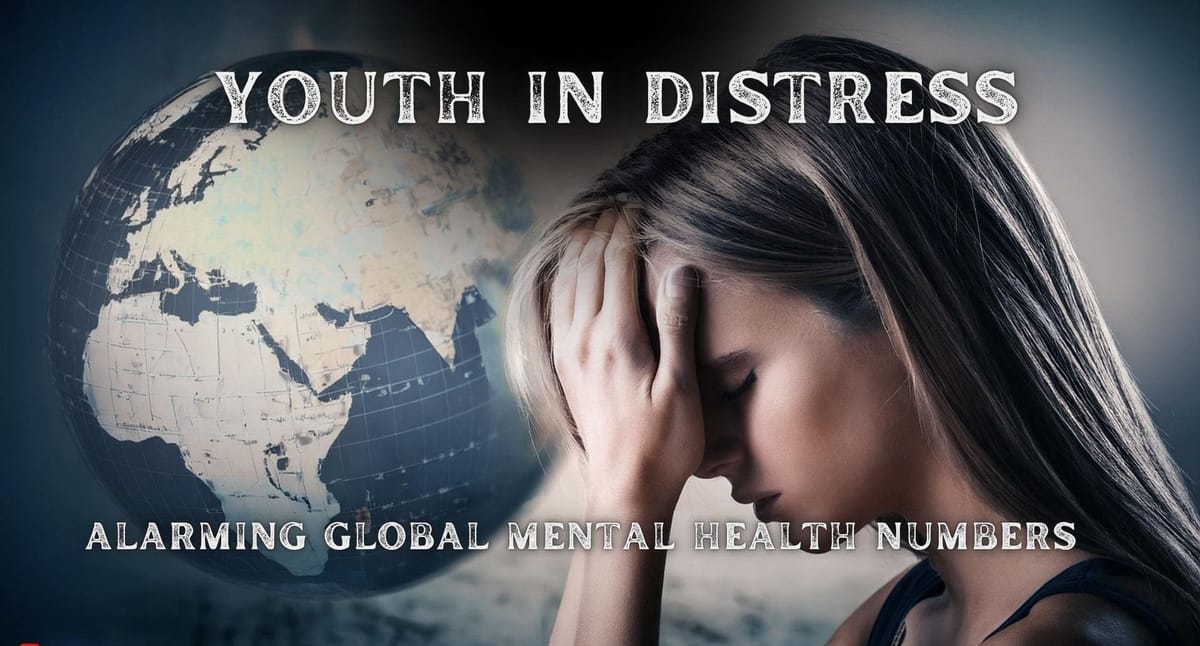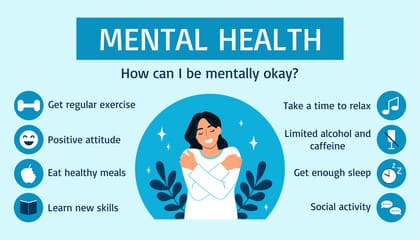Youth in Distress: Alarming Global Mental Health Statistics
Young adults, particularly those aged 18-24, report the lowest levels of mental well-being globally. This finding underscores the unique challenges of younger generations in navigating an increasingly complex and digitally driven world.

In an era where our lives are increasingly intertwined with technology, understanding the mental state of the world has never been more crucial. The Global Mind Project's groundbreaking report, "The Mental State of the World in 2023 - A Perspective on Internet-Enabled Populations," offers a comprehensive look at how we're faring psychologically in this digital age. This article delves into the key findings of this report, exploring the current mental health landscape, factors influencing our well-being, and potential solutions for a healthier global mind.
The Current Mental Health Landscape: A Global Perspective
The World Health Organization (WHO) estimates that nearly 1 billion people worldwide live with a mental disorder, with depression and anxiety being the most common. These staggering numbers highlight the urgent need for a deeper understanding of mental health trends, particularly in the context of our increasingly connected world.
The Global Mind Project's 2023 report provides invaluable insights into this landscape. Drawing from an extensive survey of 419,175 respondents across 71 countries, the study offers a unique perspective on the mental state of internet-enabled populations. This focus is particularly relevant given the pervasive influence of technology on our daily lives and mental well-being.
It is important to note that the COVID-19 pandemic has significantly impacted global mental health. The report's findings reflect a world still grappling with the psychological aftermath of lockdowns, social isolation, and economic uncertainty. According to the WHO, the global prevalence of anxiety and depression increased by 25% in the first year of the pandemic alone, a trend that continues to shape our collective mental state. With national wealth indicators such as per capita GDP negatively correlated with average mental well-being scores, this year we have made substantial progress in understanding why this is so.
Key Findings: A Deeper Dive into the Data
The report reveals several critical insights into the state of global mental health:
- Demographic Disparities: Mental well-being varies significantly across different demographic groups.
- Gender Differences: Women consistently report lower levels of mental well-being compared to men across all age groups. This gender gap highlights the need for targeted interventions and support systems that address the specific mental health challenges faced by women.
- Geographic Variations: Mental well-being scores vary considerably across countries and regions. While some nations report relatively high levels of mental health, others struggle with widespread psychological distress. These differences point to the influence of cultural, economic, and social factors on mental well-being.
- Impact of Education and Employment: The report finds a positive correlation between education levels and mental well-being. Similarly, employment status significantly influences mental health, with unemployed individuals reporting lower levels of well-being.
- Digital Influence: The study reveals complex relationships between internet usage, social media engagement, and mental health. While digital connectivity can provide support and resources, excessive use and negative online experiences are associated with poorer mental health outcomes.

Factors Influencing Mental Health: A Multifaceted Approach
Understanding the factors that shape our mental health is crucial for developing effective interventions and support systems. The Global Mind Project's report identifies several key determinants:
Social Determinants: Social factors play a significant role in shaping mental health outcomes. The report highlights how income levels, education, employment status, and social connections influence psychological well-being. For instance, individuals with strong social support networks report better mental health, underscoring the importance of community and relationships in maintaining psychological resilience.
Dr Sarah Johnson, a clinical psychologist specializing in social determinants of health, notes: "Our social environment profoundly impacts our mental state. Economic stability, access to education, and strong community ties can be protective factors against mental health challenges."
However, it's important to note that technology also offers opportunities for mental health support. Online therapy platforms, mental health apps, and digital support communities have become valuable resources for many individuals seeking help.
Cultural Context: The global nature of the study highlights how cultural attitudes towards mental health vary worldwide. These cultural differences significantly influence how health is perceived, discussed, and treated:
- Stigma: In some cultures, mental health issues carry a significant stigma, deterring individuals from seeking help.
- Traditional Practices: Some regions rely more heavily on these or spiritual practices for mental health support, which can complement or sometimes conflict with modern psychological approaches.
- Language and Expression: How mental health is discussed and expressed varies across cultures, impacting diagnosis and treatment approaches.
Understanding these cultural nuances is crucial for developing effective, culturally sensitive, global mental health interventions.

Preventative Solutions and Recommendations
Based on the report's findings, several key recommendations emerge for improving global mental well-being:
- Increase Access to Mental Health Resources: Governments and organizations should prioritize making mental health services more accessible and affordable, particularly in underserved communities.
- Promote Digital Literacy: Education programs should focus on healthy internet and social media use, helping individuals navigate the digital world while maintaining good mental health.
- Strengthen Community Support: Initiatives that foster strong community connections and social support networks can significantly improve mental well-being.
- Workplace Mental Health Programs: Employers should implement comprehensive mental health support programs, recognizing the significant impact of work on psychological well-being.
- Early Intervention: Focus on early detection and intervention for mental health issues, particularly among young adults who are at higher risk.
- Reduce Stigma: Public awareness campaigns can help reduce the stigma surrounding mental health, encouraging more people to seek help when needed.
- Personalized Approaches: Recognize that mental health solutions are not one-size-fits-all. Tailored approaches that consider individual, cultural, and social factors are more likely to be effective.

A Call to Action: Nurturing the Global Mind
As we reflect on the findings of the Global Mind Project's last report, it is clear that addressing mental health is both a challenge and an opportunity. The interconnected nature of our world means that improving mental well-being benefits not just individuals, but societies as a whole.
Dr Michael Lee, a contributor to the Global Mind Project, emphasizes: "This report isn't just about numbers and trends. It's a call to action for policymakers, healthcare professionals, educators, and individuals. We all have a role to play in fostering a mentally healthier world."
As readers, there are several ways you can engage with this important issue:
- Assess Your Mental Well-being: Consider taking the Mental Health Quotient (MHQ) assessment or similar tools to gain insights into your psychological state.
- Reach Out: If you're struggling, don't hesitate to seek help. Resources like the World Health Organization's mental health resources page offer valuable information and support.
- Support Others: Be a source of support for friends, family, and community members facing mental health challenges.
- Advocate: Use your voice to advocate for better mental health policies and resources in your community.
- Stay Informed: Continue to educate yourself about mental health issues and effective strategies for maintaining psychological well-being. This should include good nutrition - eating whole foods, eg fruits, vegetables, proteins, nuts and seeds, etc. and reducing the consumption of ultra-processed foods.
By understanding the current state of global mental health and taking proactive steps to address challenges, we can work towards a future where mental well-being is prioritized, supported, and accessible to all. The journey to a healthier global mind begins with each of us, one step at a time.







